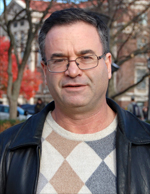NSF Quantum Information Science Funding
2010-09-30

Professor Physical/Theoretical Chemistry
Purdue University is receiving $1.5 million in National Science Foundation (NSF) funding to establish a research center to study quantum information science (QIS). The Center for Quantum Information and Computation for Chemistry will investigate information techniques used to gain novel viewpoints on diverse chemical processes from photosynthesis to bond breaking.
Quantum information science (QIS) is a new field of science and technology, combining and drawing on the disciplines of physical science, mathematics, computer science, and engineering to understand how certain fundamental laws of physics can be harnessed to dramatically improve the acquisition, transmission, and processing of information.
Sabre Kais, professor of physical/theoretical chemistry and a researcher in the Birck Nanotechnology Center, is a principal investigator on the project and says the center will bring together experts in theoretical chemistry and quantum information processing to create a set of tools for mapping quantum chemistry calculations onto quantum algorithms and calculations suitable for current and near-term quantum information processors.
“Even if quantum computers are never built, successful outcomes of this center will advance the understanding of the use of classical computers for quantum chemistry, and will help in understanding chemical phenomena in the light of quantum information theory,” says Kais.
In addition to developing new software tools for the scientific community, the center’s outreach plan includes public lectures, new course development, distance education initiatives, and activities for K-12 education.
NSF's Centers for Chemical Innovation (CCI) Program supports research centers that can address major, long-term fundamental chemical research challenges that have a high probability of both producing transformative research and leading to innovation.
Joining Professor Kais on this Phase I CCI are researchers from four other universities, including: Alan Aspuru-Guzik (Harvard); Kenneth R. Brown (Georgia Tech); Daniel A. Lidar (USC); and Peter J. Love (Haverford).
Related links: